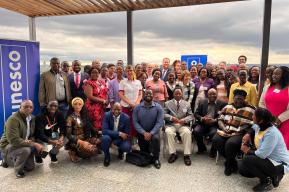News
UNESCO trained over 300 water professionals and policy-makers from 64 countries on water quality and emerging pollutants
The International Initiative on Water Quality (IIWQ) of UNESCO’s International Hydrological Programme (IHP) trained over 300 water professionals and policy-makers from 64 countries in Africa, Arab States, Asia and the Pacific, and Latin America and the Caribbean through four Regional Training Workshops on Water Quality and Emerging Pollutants. The UNESCO Regional Training Workshops on Water Quality and Emerging Pollutants took place in: Africa, (Accra, Ghana, 25-27 September 2018); Arab States (Amman, Jordan, 20-22 November 2018); Asia and the Pacific (Jakarta, Indonesia, 27-29 November 2018) and Latin America and the Caribbean (Campinas, Brazil, 6-7 December 2018).
Good quality water is essential for sustaining human well-being, livelihoods and a healthy environment. Improving water quality at the global scale is, therefore, a pre-requisite for sustainable development of the current generation and of our future generations as The United Nations 2030 Agenda and Sustainable Development Goals (SDGs) highlight the importance of improving and protecting the quality of world’s freshwater resources for sustainable development. The SDG 6 “Ensure availability and sustainable management of water and sanitation for all” calls for immediate, oriented and global action (SDG Target 6.3) to “improve water quality by reducing pollution, eliminating dumping and minimizing release of hazardous chemicals, halving the proportion of untreated wastewater and substantially increasing recycling and safe reuse globally”. Human health and ecological risks caused by water pollution by hazardous chemicals is stressed in other SDGs—in particular, in SDG 3 (health) and SDG 12 (sustainable production and consumption). Furthermore, improving the quality of freshwater resources will lead to healthier oceans and thereby will support the achievement of SDG 14 (oceans), as marine plastic and nutrient pollution is caused mainly by pollutants transported through rivers.
These training workshops represent a major effort of the UNESCO-IHP International Initiative on Water Quality to build capacity for effective water quality management for the SDGs implementation, with focus on enhancing scientific and policy capacity on managing emerging pollutants in water resources.
Emerging pollutants represent a new water quality challenge for all countries of the world, with no exception. Emerging pollutants pose a particular challenge because of a wide range of different pollutants: which include pharmaceuticals, personal care products (such as shampoos, scrubs), chemicals used industries and agriculture, as well as microplastics. Many pharmaceuticals are detected in our rivers and seawater. Every year several million tons of plastics are flowing into our seas and oceans through rivers. Recent studies report the presence of pharmaceuticals and microplastics in purified tap water, as well as in bottled water. Yet, there is limited scientific knowledge about these new pollutants—about their fate in the environment and most importantly about their long-term potential human health and ecological effects. Lack of scientific knowledge and information on emerging pollutants is preventing countries from developing and putting in place appropriate policies and measures to address this new water challenge. It is also an emerging research topic. There is not only a lack of scientific knowledge on emerging pollutants globally, but also a lack of research capacity—in particular in developing countries—to develop projects on emerging pollutants in support of policy development.
Hence, the specific objectives of the workshops were to:
• Raise the importance of improving water quality and addressing emerging pollutants for the SDGs achievement on national and regional agendas;
• Provide the state-of-the-art scientific knowledge and information on emerging pollutants;
• Enhance understanding and awareness about emerging pollutants among stakeholders;
• Provide a platform for countries to build a regional collaboration network for sharing of experiences, lessons learned and good practices on emerging pollutants;
• Promote collaboration on emerging pollutants at the regional level, including opportunities to develop joint scientific programmes and research projects.
The training has provided holistic and comprehensive in-depth knowledge, covering a wide-range of topics: emerging pollutants in the context of the SDGs; sources and pathways of emerging pollutants; monitoring and assessment; technical solutions to reduce and control of emerging pollutants in wastewater; policy approaches to managing emerging pollutants; the socioeconomic dimension; and future research and policy priorities. The International Initiative on Water Quality Case Studies on Emerging Pollutants complemented the training, as well as 68 regional and national case studies by the workshop participants, who shared national-level research and policy experience on water quality and emerging pollutants.
The training workshops furthermore provided a platform for science-policy dialogues, as the participants included policy makers, researchers and water professionals. One of the key outcomes of these trainings were the establishment of regional networks of scientific collaboration and the exchange of policy experience on water quality issues, under the UNESCO International Initiative on Water Quality.
The UNESCO training was a major global effort, which mobilized and disseminated knowledge for managing emerging pollutants in order to reduce human health and ecological risks and to protect our precious freshwater resources for the current and future generations, and for healthy ecosystems. The workshops have made important contributions to capacity building, the promotion of scientific research, and the strengthening of the development and implementation of appropriate policy frameworks. They also fostered South-South scientific cooperation and provided platforms for the experience sharing on solutions to respond the global water quality challenge.
These training workshops were organized in the framework of the International Initiative on Water Quality flagship Project on “Emerging Pollutants in Wastewater Reuse in Developing Countries”, funded by Sweden.
Several UNESCO Water Family members and partners hosted the workshops, including: Regional Centre for Integrated River Basin Management (RC-IRBM) in Nigeria, under the auspices of UNESCO; World Islamic Education and Sciences University (WISE) in Jordan; Asia-Pacific Regional Centre for Ecohydrology (APCE), under the auspices of UNESCO; and University of Campinas and Brazilian Chemical Society. UNESCO Regional and National Offices in respective regions and countries collaborated on the organization of these workshops.
For more information, please contact Ms Sarantuyaa Zandaryaa (s.zandaryaa@unesco.org).









